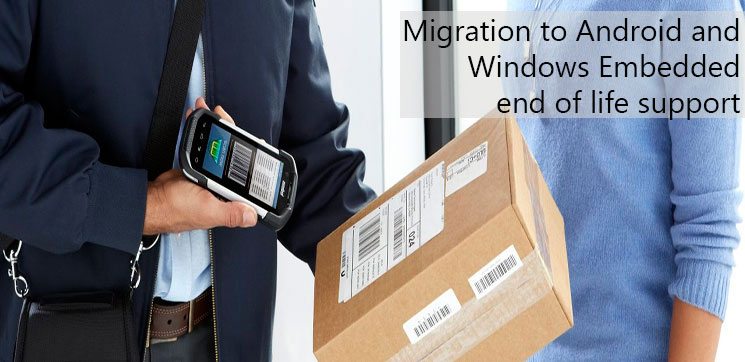Windows Embedded CE end of life – what are your options?
If your business relies on software running on Windows Embedded devices, porting your apps should be a priority with Microsoft ending software support for Windows embedded OS from 2018.
Organisations using Windows CE and Windows Embedded handhelds should take note of the key dates in end of life (EOL) support for Microsoft Embedded Operation System (OS):
– 10 June 2018: End of life for Windows Embedded CE 6.0
– 9 June 2019: End of life for Windows Embedded 8.1 Handheld
– 4 January 2020: End of life for Windows Embedded 6.5 Handheld
The clock is ticking for Windows Embedded
Many rugged devices are still running Windows Embedded systems today, so it’s time to start planning the move to other platforms and hardware as you begin to replace your older handhelds.
Depending on the number of devices in your organisation, you’ll want to get your upgrade strategy in place sooner rather than later to ensure there is a smooth roll-out, as the final deadline in 2020 isn’t that far off, and the closest is less than six months away.
When you switch away from Windows Embedded, your apps will need to be rewritten in order for them to work on Android. It is here that the clock is really ticking, your apps may have taken years to develop, design, and test, and technical teams will need enough time to reproduce them.
Want to discuss your migration requirements? Speak to the Portech expert mobile enterprise team.
Should you switch to Android?
Whether you’re in the retail, healthcare, manufacturing, logistics, field services, government or another industry using rugged devices, Android is likely to be a frontrunner when planning your upgrade strategy.
Users familiar with Android’s UI on mobile phones will find the transition to a new Android-powered device less painful and with touchscreen technology a part of everyday life, most operators can intuitively use an Android enabled device with little additional instruction.
Leading hardware manufacturers are undertaking a major push to put current versions of Android onto rugged devices and handhelds. This is reflected in the latest rugged mobile devices – many resemble a robust Android smartphone.
If you want to explore how Android is right for your mobile enterprise apps, contact Portech today.
Enterprise-grade Android for rugged devices
Rugged device manufacturers have historically used Windows based OS (Windows CE and Windows Embedded) to power their devices, but with the end of life approaching, it’s worth looking at what Android is offering to business and rugged systems users:
Enterprise features in Android: to extend its footprint beyond the consumer market, Google is increasing enterprise features, including encryption, device administration, device management, multi-user capability and support of Android for Work.
SDK support: enterprise customers are developing Android applications using rich functionality from the Android SDK and developer-friendly tools.
Stability: The Android stack comprises of mature software from many open source projects. Google also puts software through multiple levels of testing. Additionally, chipset vendors improve software quality on hardware after porting. Today, device manufacturers can host quality software, and the growth in device manufacturers using Android as the OS of choice.
Security enhancements: Security patches for the Android platform are frequently released by Google and mandated through compliance tests.
To find out more about how Android can replace Windows CE in your business, get in touch with Portech’s mobile enterprise experts.
Overcoming challenges in porting to Android for rugged devices
Some of the Windows migration to Android challenges that Portech are ready to address for you include:
Resistive touch screen: If a resistive touch screen is preferred, this usually requires calibrating and fine-tuning touch points for single and multi-users.
Bar code scanner: The bar code scanning feature is necessary for rugged devices involved in inventory management. We can help with this feature for reading, deciphering bar codes, and securely delivering the deciphered bar code with extremely fast response time.
Keypad: If you are porting to Android and a new handheld, each device usually has its own keypad or specific keys. Portech is able to remap to different keys or map to launch specific quick launch apps.
Connectivity: We are able to enhance connectivity and networking to include enterprise safety authentication methods for Wi-Fi, VPN, and more. Since rugged devices are deployed in customer premises, we can work with you to ensure interoperability of devices with various access points.
Power management: Rugged device use in the field requires efficient usage of battery power. We thoroughly profile power requirements and fine tune for a range of use cases.
Testing: We have worked with a number of devices and are aware of stringent quality criteria set by rugged device manufacturers, and are able to fix known issues, to deliver fault tolerant software.
Android upgrades: As lifespan of a rugged device is between three to five years, we work with our clients to apply security patches or to upgrade to newer versions of Android.
To discuss your rugged mobile device requirements after support for Windows CE ends, please speak to the Portech technical team with your requirements.
Why Portech for your Windows to Android migration?
25 years of experience in mobile enterprise app and software development means that Portech clients are confident in their ability to deliver a wide range of projects, from logistics, warehousing, retail, merchandising to field service and much more.
Clients such as Vimto Out of Home, The Works, LowriBeck and The Range trust Portech to support their mobile strategies with software, hardware and application development skills.
 Simon Vinall
Simon Vinall

 Simon Vinall
Simon Vinall